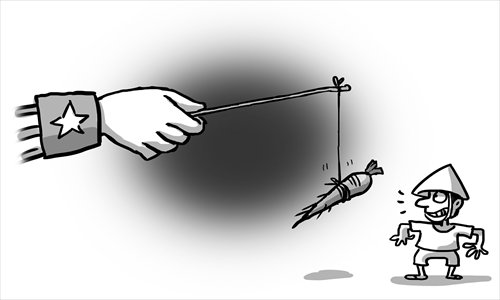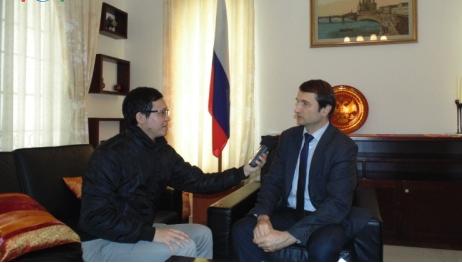TaiShang
ELITE MEMBER

- Joined
- Apr 30, 2014
- Messages
- 27,848
- Reaction score
- 70
- Country
- Location
Trade leverage can halt Vietnam’s turn to US
Source:Global Times Published: 2015-1-25

The new round of Trans-Pacific Partnership (TPP) negotiations begins on Monday. When Vietnamese Prime Minister Nguyen Tan Dung shook hands with US Ambassador to Vietnam Ted Osius on January 7, Osius told him that the White House would be more flexible so that talks could be wrapped up in March for approval by Congress in May.
The marathon negotiations, which started more than five years ago, seem to have entered the last phase as the US makes some compromises. Hanoi hopes this economic treaty will boost Vietnam's economic growth, and most importantly, relieve itself from long-term reliance on imports from China. What's more, growing tensions in the South China Sea have been pushing Vietnam to seek a patron to counterbalance China's influence. The US is its best option.
This year marks the 20th anniversary of the normalized relations between Vietnam and the US. Regardless of enduring antagonism, the occasion offers a critical impetus for both sides to come closer. Washington's compromise in the TPP negotiations is a gift to Hanoi, but the gift is given at a price.
History has proven millions of times that the US will never give in for no reason in negotiations, particularly when it has gained the upper hand. In this case, Washington's concession is not a tactical one made to support petty interests but a strategic one that might impact the entire regional political landscape.
2015 will also be a politically intense year for Vietnam, as the Communist Party's 12th Congress will renew its leadership in January 2016. Dung, the incumbent prime minister of Vietnam, is probably already aiming for the top post, general secretary of the ruling party. In the divided Vietnamese political arena, Dung, a representative of the pro-American faction, will probably dramatically change Vietnam's national strategy and foreign policy to welcome more US engagement.
Washington has realized Dung's potential as an effective proxy. Knowing the 12th Congress might be the only chance for Dung to take supreme power, the US intends to praise the accomplishments of the TPP talks as one of Dung's major achievements. In this case, Washington is attempting its old color revolution tricks in Vietnam in an attempt to solicit Vietnam as a Philippines-like pawn to constrain China's rise.
Therefore, 2015 is a critical year for the tripartite game between China, the US and Vietnam. Although Beijing and Hanoi quickly restored ties late last year after a year-long face-off, Washington's attempt to rope in Hanoi will easily break the vulnerable regional security framework, posing hazards to the integrity of China's territorial sovereignty.
Thus, what China will face with its neighbor in the south will probably be a situation even more intense than what it experienced in 2014.
Unlike the US, which brazenly intervenes in other countries' domestic affairs, China could employ more acceptable means to help Vietnam benefit from a positive bilateral relationship. If Vietnam sides with the US to counter China,however, Beijing is also likely to take punitive measures.
In order to prevent Hanoi from continuing to tilt toward Washington, Beijing needs to take a slightly softer stance on some issues to ease the tense situation in the South China Sea. Otherwise, in growing tensions, the odds that Vietnam will be discomfited and become an ally of the US will greatly increase.
China should give full play to its traditional advantages as a major trader with Vietnam and employ various economic measures, particularly investment, to boost Vietnamese infrastructure and economic strength. China should redouble its efforts to promote interconnection between both countries, such as taking advantage of the 21st Century Silk Road project. Real benefits will make Vietnam stay clear-headed enough to weigh the pros and cons when making decisions that involve China and the US.
Source:Global Times Published: 2015-1-25

The new round of Trans-Pacific Partnership (TPP) negotiations begins on Monday. When Vietnamese Prime Minister Nguyen Tan Dung shook hands with US Ambassador to Vietnam Ted Osius on January 7, Osius told him that the White House would be more flexible so that talks could be wrapped up in March for approval by Congress in May.
The marathon negotiations, which started more than five years ago, seem to have entered the last phase as the US makes some compromises. Hanoi hopes this economic treaty will boost Vietnam's economic growth, and most importantly, relieve itself from long-term reliance on imports from China. What's more, growing tensions in the South China Sea have been pushing Vietnam to seek a patron to counterbalance China's influence. The US is its best option.
This year marks the 20th anniversary of the normalized relations between Vietnam and the US. Regardless of enduring antagonism, the occasion offers a critical impetus for both sides to come closer. Washington's compromise in the TPP negotiations is a gift to Hanoi, but the gift is given at a price.
History has proven millions of times that the US will never give in for no reason in negotiations, particularly when it has gained the upper hand. In this case, Washington's concession is not a tactical one made to support petty interests but a strategic one that might impact the entire regional political landscape.
2015 will also be a politically intense year for Vietnam, as the Communist Party's 12th Congress will renew its leadership in January 2016. Dung, the incumbent prime minister of Vietnam, is probably already aiming for the top post, general secretary of the ruling party. In the divided Vietnamese political arena, Dung, a representative of the pro-American faction, will probably dramatically change Vietnam's national strategy and foreign policy to welcome more US engagement.
Washington has realized Dung's potential as an effective proxy. Knowing the 12th Congress might be the only chance for Dung to take supreme power, the US intends to praise the accomplishments of the TPP talks as one of Dung's major achievements. In this case, Washington is attempting its old color revolution tricks in Vietnam in an attempt to solicit Vietnam as a Philippines-like pawn to constrain China's rise.
Therefore, 2015 is a critical year for the tripartite game between China, the US and Vietnam. Although Beijing and Hanoi quickly restored ties late last year after a year-long face-off, Washington's attempt to rope in Hanoi will easily break the vulnerable regional security framework, posing hazards to the integrity of China's territorial sovereignty.
Thus, what China will face with its neighbor in the south will probably be a situation even more intense than what it experienced in 2014.
Unlike the US, which brazenly intervenes in other countries' domestic affairs, China could employ more acceptable means to help Vietnam benefit from a positive bilateral relationship. If Vietnam sides with the US to counter China,however, Beijing is also likely to take punitive measures.
In order to prevent Hanoi from continuing to tilt toward Washington, Beijing needs to take a slightly softer stance on some issues to ease the tense situation in the South China Sea. Otherwise, in growing tensions, the odds that Vietnam will be discomfited and become an ally of the US will greatly increase.
China should give full play to its traditional advantages as a major trader with Vietnam and employ various economic measures, particularly investment, to boost Vietnamese infrastructure and economic strength. China should redouble its efforts to promote interconnection between both countries, such as taking advantage of the 21st Century Silk Road project. Real benefits will make Vietnam stay clear-headed enough to weigh the pros and cons when making decisions that involve China and the US.








